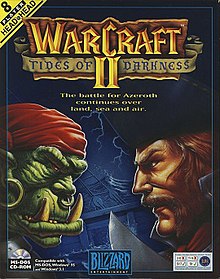| Warcraft II: Tides of Darkness | |
|---|---|
 | |
| Developer(s) | Blizzard Entertainment |
| Publisher(s) |
|
| Producer(s) | |
| Designer(s) | Ron Millar |
| Programmer(s) |
|
| Writer(s) | Chris Metzen |
| Composer(s) | Glenn Stafford |
| Series | Warcraft |
| Platform(s) | MS-DOS, Classic Mac OS, Saturn, PlayStation, Windows |
| Release | MS-DOS, Mac OS Saturn, PlayStation |
| Genre(s) | Real-time strategy |
| Mode(s) | Single-player, multiplayer |
Warcraft II: Tides of Darkness is a fantasy real-time strategy computer game developed by Blizzard Entertainment and released for MS-DOS and Microsoft Windows in 1995 and Mac OS in 1996 by Blizzard's parent, Davidson & Associates. A sequel to Warcraft: Orcs & Humans, the game was met with positive reviews and won most of the major PC gaming awards in 1996. In 1996, Blizzard released an expansion pack, Warcraft II: Beyond the Dark Portal, for DOS and Mac OS, and a compilation, Warcraft II: The Dark Saga, for the PlayStation and Sega Saturn. The Battle.net edition, released in 1999, included Warcraft II: Beyond the Dark Portal, provided Blizzard's online gaming service, and replaced the MS-DOS version with a Windows one.
In Warcraft II, as in many real-time strategy (RTS) games, players collect resources to produce buildings and units in order to defeat an opponent in combat. Players gain access to more advanced units upon construction of tech buildings and research. The majority of the display screen shows the part of the territory on which the player is currently operating, and, using the small minimap, the player can select another location to view and operate on. The fog of war completely hides all territory (appears black) which the player has not explored: terrain that has been explored is always visible in gray tones, but enemy units remain visible only so long as they stay within a friendly unit's visual radius. Buildings remain displayed as the player last saw them, and do not register unobserved changes such as being built, damaged, or repaired, etc.
Warcraft II was a commercial hit, with global sales above 3 million units by 2001; roughly two-thirds were sold in the United States. The game strongly influenced the company's next successful RTS, the futuristic StarCraft (1998) in gameplay, and in attention to personality and storyline. In 1996, Blizzard announced Warcraft Adventures: Lord of the Clans, an adventure game in the Warcraft universe, but canceled the project in 1998. Warcraft III: Reign of Chaos, released in 2002, used parts of Warcraft Adventures' characters and storyline, but extended the gameplay used in Warcraft II.
- ^ "Electronic Arts - News Room, Electronic Arts to Ship Warcraft II: The Dark Saga for the PlayStation and Sega Saturn". February 7, 1998. Archived from the original on February 7, 1998. Retrieved April 15, 2023.